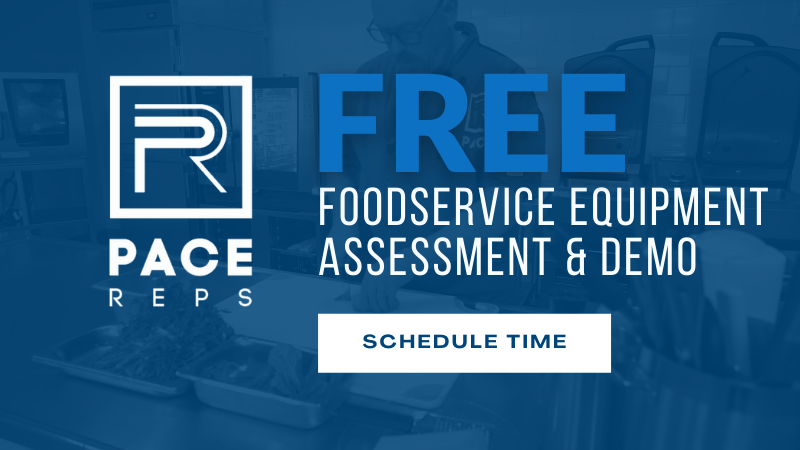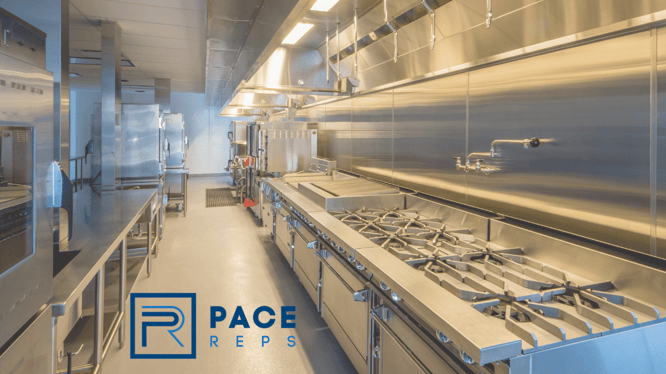
Anyone who has spent time in a commercial kitchen knows that details matter. And one of the details that can matter most to kitchen personnel is the floor in their work area. With a wide variety of flooring systems available, it can be difficult to choose the best flooring solution for a commercial kitchen. So it’s worth considering the qualities that are truly most important to have in any kitchen or walk-in cooler/freezer flooring system.
At a minimum, every kitchen flooring system should have these qualities:
Slip-Resistance
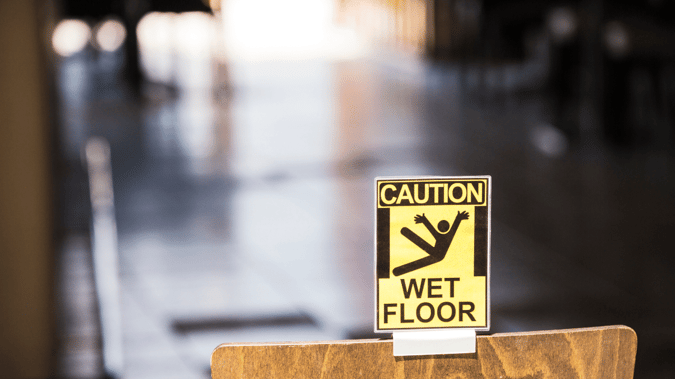
It goes without saying that the best flooring for a commercial kitchen should be slip-resistant – even when wet – to provide safe footing for your crew. Yet according to the National Floor Safety Institute, an astounding 85% of worker’s compensation claims are from employees slipping on floors, and 22% of those claims result in employees losing a whopping 31 days of work. With so many workers’ compensation claims being for slips and falls, it becomes clear that slip resistance is a vital component in any flooring solution.
While ceramic tile floors have been an industry staple for years, they do not provide significant levels of slip resistance when wet, and the same can be said of natural stone tile and concrete – especially when sealed or painted. One of the more recent approaches over the last few years has been the application of textured epoxy to concrete floor surfaces, which does provide significantly enhanced slip resistance, even if it does little to address the fatigue-causing characteristics of the concrete floor that lies underneath.
Using a certified slip and skid-resistant product may not completely eliminate falls but will help eliminate a large percentage of slip and fall accidents when used in combination with foodservice safety shoes.
Durability
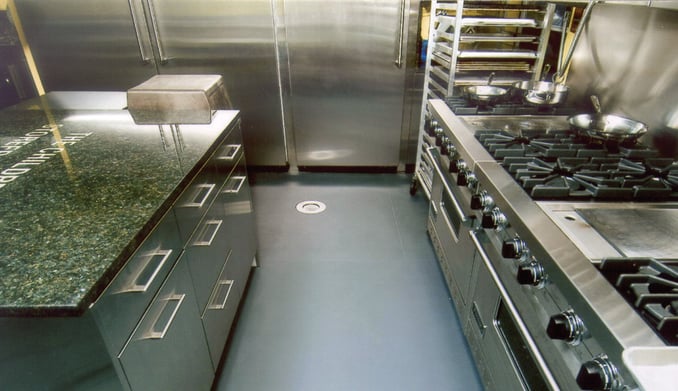 Commercial kitchens are well-known for their high-traffic areas. Having staff continuously standing, walking, and working on a floor for long periods day after day can affect how well the kitchen flooring stands up. Kitchen floors have to withstand a variety of thermal shocks – i.e., spills of boiling cooking oil, water, and other liquids.
Commercial kitchens are well-known for their high-traffic areas. Having staff continuously standing, walking, and working on a floor for long periods day after day can affect how well the kitchen flooring stands up. Kitchen floors have to withstand a variety of thermal shocks – i.e., spills of boiling cooking oil, water, and other liquids.
Dropped pots, pans, and other utensils can quickly damage ceramic tile and stone tile floors. And everyday foodservice items such as grease, acids, and even some floor detergents can deteriorate certain floor materials more quickly than others. The grout between these tiles can be particularly vulnerable to deterioration over time, allowing tiles to loosen and fall out altogether, leading to unsightly floor damage. Replacement of cracked tiles, along with the regrouting on a routine basis, can become a very expensive proposition over the lifetime of a ceramic tile floor.
Finding a flooring solution that can withstand continuous cleaning, traffic, and typical commercial use will help will provide foodservice facilities with trouble-free floors for many years.
Ease of Maintenance
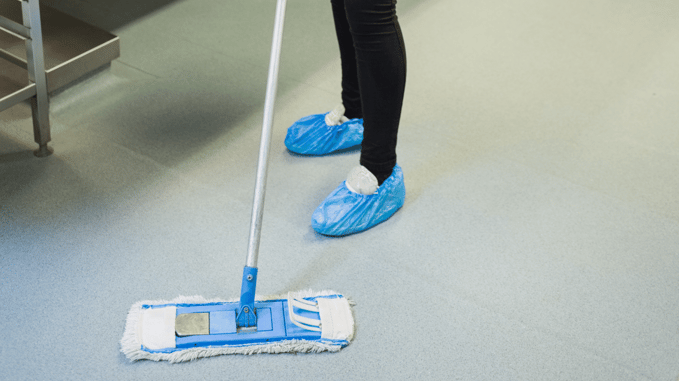
Well-maintained kitchen floors are cleaned several times per day, not just for safety reasons but also for sanitation and hygiene purposes. Flooring should be easy to clean and sanitize, standing up to frequent cleaning and scrubbing, with a watertight seal and non-porous surfaces. Foodservice kitchens need floors that will stand up to all of these cleanings and have antimicrobial and antibacterial properties that will help repel bacteria and mold.
Another factor to consider is how porous the flooring material will be. Commercial kitchen flooring should have as few seams as possible so that bacteria do not have a place to grow. Flooring types that crack and peel away from seams also need to be replaced more often, causing additional downtime and ongoing safety issues.
Staff Comfort
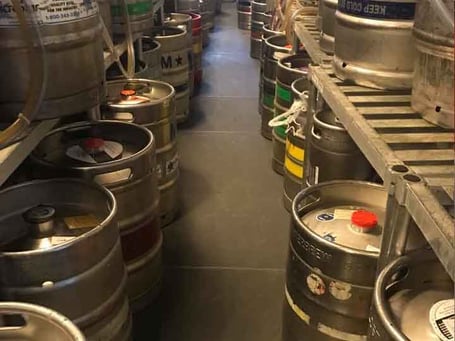
It’s very likely that ceramic tile, natural stone tile, and concrete floors (even epoxy-coated ones) have been major contributors to the growth of the anti-fatigue mat industry.
Kitchen staff tend to be working on their feet all day long, and they’re often working 10+ hours a day. Standing on these hard floors for hours can lead to significant employee fatigue, not to mention chronic back, hip, leg, and foot issues. Selecting a flooring system that is comfortable to stand on for extended periods minimizes stress on the body, making for happier and healthier employees. Selecting a flooring material that is extremely durable yet provides some “give” will greatly enhance staff comfort while minimizing fatigue and physical wear.
So . . . does anyone provide a flooring system that provides ALL of the above qualities without sacrificing on slip resistance, durability, ease of maintenance, and staff comfort?
The answer is a resounding YES.
We invite you to check out Titan Thermoplastic Flooring:
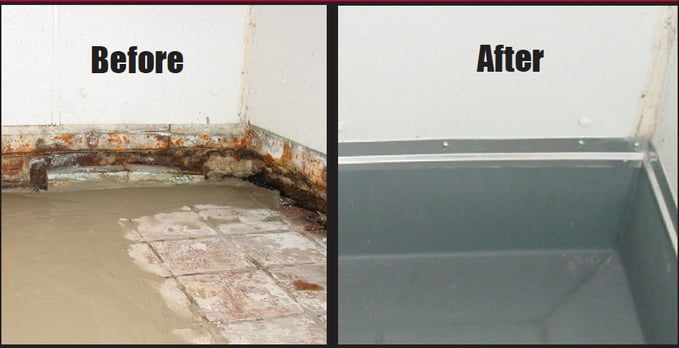
- Will far outlast standard tile and concrete flooring
- Exceeds all non-skid and health department standards
- Ideal for use in high-traffic commercial spaces
- Drastically reduce Worker’s Comp. claims due to slipping on kitchen floors
- Best commercial flooring warranty in the industry
- Less stress and fatigue on employees; eliminate the need for anti-fatigue mats
- Resistant to over 100 harsh chemicals including muriatic acid, oleic acid and phosphoric acids
- Thermoplastic is easier to clean and squeegee than other flooring
- Prevents mold and bacterial growth
- Reduces glass and plate breakage
- Can stand up to wet environment and power washing 24/7
- Impact/puncture resistant
- New or replacement kitchen floors
- Outstanding solution for REPLACING old, deteriorated walk-in cooler or freezer floors


